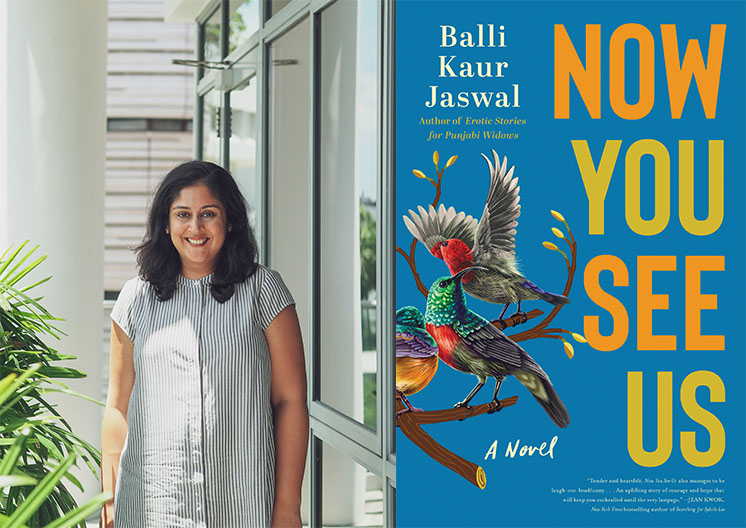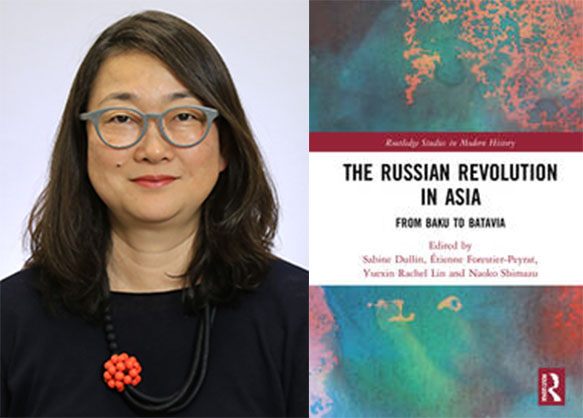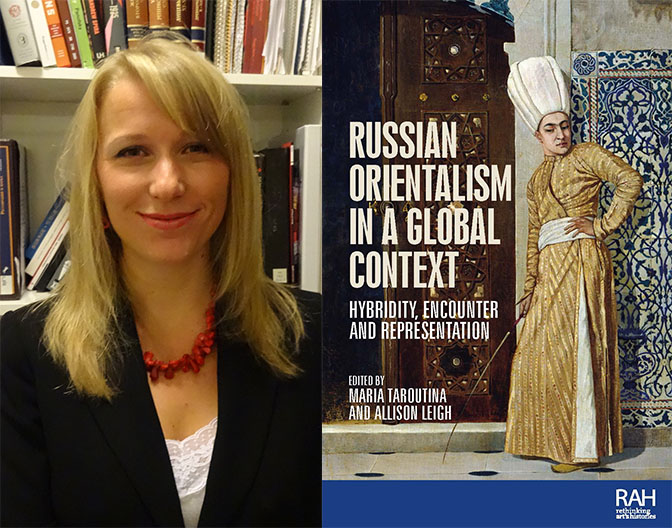Humanities faculty publications, from fiction to history
Recent faculty publications from the Humanities Division range from Russian Studies to creative fiction
Research is a core activity that contributes to and complements teaching excellence in our community of learning. Lecturer of Humanities (English Language and Literature) Balli Kaur Jaswal, Professor of Humanities (History) Naoko Shimazu and Associate Professor of Humanities (Art History, Russian and Slavic Studies) Maria Taroutina share their experiences of working on their latest publications, which range from creative fiction to Japanese history and Russian Studies, illustrating the diversity of the Humanities discipline at Yale-NUS College.
 Ms Balli Kaur Jaswal with her upcoming novel Now You See Us. Image provided by Ms Jaswal for Yale-NUS College.
Ms Balli Kaur Jaswal with her upcoming novel Now You See Us. Image provided by Ms Jaswal for Yale-NUS College.
Lecturer of Humanities (English Language and Literature) Balli Kaur Jaswal’s fifth fiction book Now You See Us will be released internationally by Harper Collins Publishers by May 2023.
The novel follows the lives of three Filipina maids working in Singapore, as they set out to help exonerate a fellow maid accused of murdering her female employer. These events were directly inspired by Lecturer Jaswal’s own experiences of living in both Singapore and Manila, and the varying accounts she heard about the Flor Contemplacion case. Flor Contemplacion was a Filipino domestic worker who worked in Singapore in the 1990s and was convicted of murdering another domestic worker and her employer’s child.
While she has written murder mysteries before, Ms Jaswal noted that this book offered an additional challenge since the murder set off the chain of events in the novel, and she worked to balance the suspenseful pacing of the plot while expanding the complexity of the domestic workers and their lifestyles. Although this proved to be quite challenging, Ms Jaswal found it ultimately fulfilling.
As a writer, Ms Jaswal shared that her work was influenced by the immersive environment in which she teaches. She appreciated especially how “Yale-NUS places a strong emphasis on probing conventional narratives and looking beyond a single story about a place or its individuals”.
 Professor Naoko Shimazu and her upcoming book “The Russian Revolution in Asia: From Baku to Batavia”. Image obtained from Yale-NUS College Website and Routledge.
Professor Naoko Shimazu and her upcoming book “The Russian Revolution in Asia: From Baku to Batavia”. Image obtained from Yale-NUS College Website and Routledge.
Professor of Humanities (History) Naoko Shimazu’s co-edited volume The Russian Revolution in Asia: From Baku to Batavia discusses the legacies of the Russian Revolution on the Southeast Asian region and analyses how revolutionary communism intersected with a variety of Asian contexts.
As a global historian of Asia with an interest in the social and cultural histories of modern societies at war, Prof Shimazu provides an Asian perspective on the Russian Revolution, a historical period that is typically construed as a European event.
The volume builds on Prof Shimazu’s major research interests in diplomatic relations in Asia – especially Japan – during the twentieth century, with a focus on the Cold War era. For example, one of Prof Shimazu’s ongoing research projects that has now spanned over a decade focuses on the Bandung Conference of 1955, a conference where Asian and African nations gathered to discuss peace and the role of the Third World in the Cold War. Her extensive work on this subject was also translated into a Historical Immersion module at Yale-NUS, titled The Bandung Conference of 1955.
Professor Shimazu’s work in this field has earned her many accolades. In 2019 she was elected leader of the Inter-Asia Engagements Research Cluster Leader at the Asia Research Institute, the National University of Singapore, in recognition of her expertise in the region.
Currently, she is also working on two more co-edited volumes on diplomacy in Asia during the twentieth century, which are eagerly anticipated.
In the area of art history, Associate Professor of Humanities (Art History, Russian and Slavic Studies) Maria Taroutina has been recognised for her expertise in this field. In 2019, she was awarded the University of Southern California Book Prize in Literary and Cultural Studies by the Association for Slavic, East European, and Eurasian Studies for the English publication of The Icon and the Square, which explored how the common interest in Russia’s Byzantine past between conservative and radical forces at the turn of the 20th century shaped Russian modernism.
Assoc Prof Taroutina’s upcoming publications include a Russian translation of her 2018 work The Icon and the Square: Russian Modernism and the Russo-Byzantine Revival, as well as a co-edited volume, Russian Orientalism in a Global Context: Hybridity, Encounter and Representation, 1740-1940, which will be released in June this year.
 Assoc Prof Maria Taroutina and her upcoming volume Russian Orientalism in a Global Context: Hybridity, Encounter and Representation. Image provided by Assoc Prof Maria Taroutina.
Assoc Prof Maria Taroutina and her upcoming volume Russian Orientalism in a Global Context: Hybridity, Encounter and Representation. Image provided by Assoc Prof Maria Taroutina.
Her co-edited volume, Russian Orientalism in a Global Context, examines the various ways in which Russia’s artistic praxis was impacted by encounters—both real and imagined—with the cultures from the East (or Vostok, in Russian). Assoc Prof Taroutina said, ““More specifically, Russian Orientalism in a Global Context interrogates how Russia’s perception of its position on the periphery of the West and its simultaneous self-consciousness as a colonial power shaped its artistic and cultural identity. It also explores the extent to which cultural practitioners participated in the discursive matrices that advanced Russia’s colonial machinery on the one hand and critiqued and challenged it on the other.”
Recent global events such as the ongoing conflict in Ukraine has made access to Russian archival research difficult to access. Assoc Prof Taroutina was grateful for Yale-NUS College’s support in funding her travel and archival research for both publications.
With publications ranging over a variety of genres, geographies and temporalities, these recent works by faculty from the Humanities Division represent a cross section of the expertise and interests of the teaching staff at Yale-NUS College. Notably, their unique approaches to discussing contemporary events using the lenses of fiction and academic writing is representative of the College’s ethos of combining a multitude of disciplines to understand global issues in a holistic manner.





